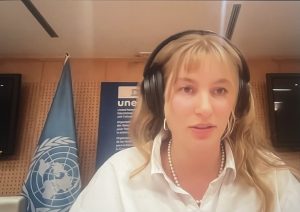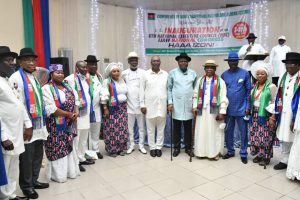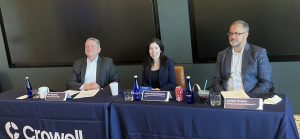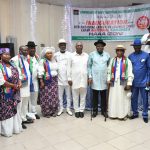By Seleman Yusuph Kitenge
The recently concluded webinar on science communication, held on August 22, 2024, brought together a diverse group of participants from across the globe, highlighting the significance of genome editing (GEd) and its potential to transform agriculture, food security, and resilience to climate change in Africa. The panelists, drawn from academia, research institutions, and advocacy groups, shared insights on both the science behind GEd and the critical role of communication in ensuring its widespread understanding and adoption by African Member States.
As Africa grapples with food insecurity, climate change, and population growth, science and technology present unprecedented opportunities to address these challenges. Genome editing, as an emerging technology, has the potential to revolutionize African agriculture by improving crop yields, enhancing resistance to pests and diseases, and ensuring climate resilience. However, for such technological advancements to take root and gain public trust, effective science communication is essential. The webinar underscored this need, exploring how the media, scientists, policymakers, and communication professionals can work together to demystify complex scientific concepts for broader audiences.
Bridging the Gap Between Science and Society
One of the central themes of the webinar was the importance of translating scientific knowledge into accessible and relatable information for the public. Prof. Olalekan Akinbo, in his opening remarks, emphasized that while GEd offers tremendous potential, its success depends on clear, accurate, and transparent communication. The role of media and communication personnel in bridging the gap between scientists and the public is critical, particularly in Africa, where misinformation and skepticism about biotechnology can impede progress.
This sentiment was echoed by Ms. Isaac Nkechi of the Alliance for Science, who provided an overview of effective science communication strategies. She highlighted five key approaches to communicating GEd: focusing on public benefits, connecting GEd solutions to human health, framing the technology as an evolution rather than a revolution, leveraging relatable expert spokespeople, and using clear analogies and visuals. These strategies, she explained, are essential to counteract the fear and confusion that often surround scientific advancements.
In a world where misinformation can spread rapidly, it is vital to present GEd not as a radical and unfamiliar technology but as a logical extension of existing agricultural practices. By emphasizing its potential benefits, such as improved crop varieties and enhanced food security, communicators can help build public trust and encourage acceptance of this technology.
The Role of GEd in African Agriculture
One of the key presentations at the webinar was delivered by Dr. Abel Sefasi from the Lilongwe University of Agriculture and Natural Resources (LUANAR) in Malawi. He provided an in-depth overview of GEd science, simplifying complex molecular biology concepts for the diverse audience. Dr. Sefasi outlined how genome editing differs from traditional genetic modification, explaining that while genetic modification often involves introducing foreign genes, GEd can make precise changes to an organism’s DNA without adding external genetic material. This distinction is crucial in discussions about the safety and ethical implications of GEd, as it suggests that GEd may be more acceptable to the public than traditional GMOs.
Africa has already seen some success in GEd applications, particularly in the development of crops that are more resilient to drought, pests, and diseases. Dr. Sefasi also touched on the potential for genome editing in animal breeding, offering the prospect of improving livestock productivity, which is particularly important for the continent’s rural economies. However, he emphasized that while the science is promising, communication efforts must keep pace with scientific advancements to ensure widespread understanding and support.
Addressing Ethical and Regulatory Concerns
The ethical and regulatory dimensions of GEd were also explored during the webinar, particularly in the Q&A session. One participant raised concerns about whether GEd products should be classified as genetically modified organisms (GMOs) and regulated accordingly. This question is particularly relevant in the African context, where GMO regulations vary significantly across countries. Some nations have adopted strict rules, while others have taken a more open approach to biotechnology.
The panelists acknowledged that the regulatory landscape for GEd remains complex, with some ambiguity about how to classify and regulate these products. As Prof. Akinbo noted in his closing remarks, there is a need for a harmonized regulatory framework across Africa, guided by scientific evidence and ethical considerations. This would ensure that GEd products are developed and deployed safely while maximizing their potential benefits for food security and climate resilience.
The webinar also touched on the importance of intellectual property rights in the context of genome editing. Participants raised concerns about whether African countries could retain control over their agricultural resources in the face of increasing reliance on imported seeds and fertilizers, particularly in light of the recent disruptions caused by the Russia-Ukraine conflict. Developing robust intellectual property frameworks that protect African farmers’ interests will be essential as the continent seeks to scale up GEd technologies.
Building Public Trust and Engagement
Perhaps the most important takeaway from the webinar was the recognition that science communication must be an ongoing, inclusive process. Public trust in GEd technology will not be built overnight; it will require consistent engagement, transparency, and collaboration between scientists, communicators, policymakers, and the public.
One of the most insightful questions raised during the Q&A session was about how to build public trust in the safety and ethical use of genome editing. The panelists agreed that education is key. As Dr. Billy Ratemo noted, there are significant capacity-building efforts underway to educate consumers about GEd, but more needs to be done to involve local communities and indigenous knowledge systems in the research process. By integrating traditional knowledge with modern science, researchers can ensure that the solutions developed are culturally appropriate and sustainable.
Furthermore, as Ms. Nkechi pointed out in her presentation, it is crucial to engage with diverse stakeholders, including Farmers, Regulators, and Civil Society organizations, to create a supportive environment for GEd adoption. This means not only addressing the scientific and technical aspects of GEd but also engaging with the public on the ethical, environmental, and socioeconomic implications of the technology.
The webinar on science communication provided a valuable platform for discussing the potential of genome editing in Africa and the importance of clear, effective communication to ensure its success. As Africa continues to face significant challenges related to food security and climate change, technologies like GEd offer promising solutions. However, for these technologies to be embraced by the public, Scientists and Communicators must work together to demystify the science, address ethical and regulatory concerns, and build trust through transparent and inclusive engagement. The road ahead for GEd in Africa is promising but complex. With the right communication strategies, regulatory frameworks, and public engagement, genome editing can play a pivotal role in transforming African agriculture and ensuring a more food-secure future for the continent.






















